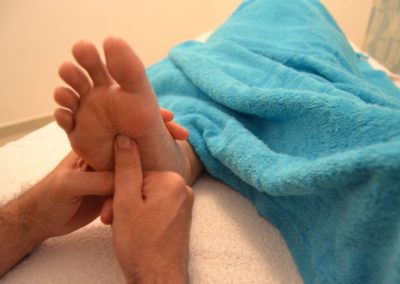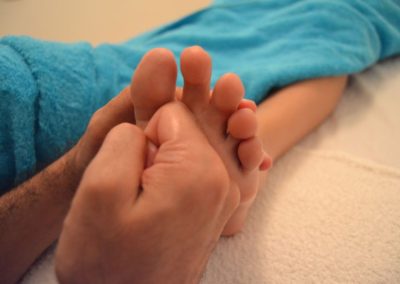MEDICAL TREATMENTS
REFLEXOLOGY (Session 45 Minutes)
Reflexology, also known as zone therapy, is an alternative medical practice involving the application of pressure to specific points on the feet and hands. This is done using specific thumb, finger, and hand massage techniques
Reflexology rests on the ancient Chinese belief in qi (pronounced “chee”), or “vital energy.” According to this belief, qi flows through each person. When a person feels stressed, their body blocks qi.
This can cause an imbalance in the body that leads to illness. Reflexology aims to keep qi flowing through the body, keeping it balanced and disease free.
In Chinese medicine, different body parts correspond with different pressure points on the body. Reflexologists use maps of these points in the feet, hands, and ears to determine where they should apply pressure.
They believe their touch sends energy flowing through a person’s body until it reaches the area in need of healing.
What are the potential benefits of reflexology?
Reflexology is linked to many potential benefits, but only a few of them have been evaluated in scientific studies.
So far, there’s limited evidence that reflexology may help to:
- reduce stress and anxiety
- reduce pain
- lift mood
- improve general well-being
In addition, people have reported that reflexology helped them:
- boost their immune system
- fight cancer
- get over colds and bacterial infections
- clear up sinus issues
- recover from back problems
- correct hormonal imbalances
- boost fertility
- improve digestion
- ease arthritis pain
- treat nerve problems and numbness from cancer drugs (peripheral neuropathy)
*Trusted Source Healthline.com website
What are the potential benefits of reflexology?
Reflexology have some value as a complementary therapy to help reduce symptoms and improve someone’s quality of life, much like massage. Since the massaged area is the feet, for some people that will provide even more relief of stress or discomfort.
Here’s a look at what the research says about using reflexology to manage pain and anxiety.
Pain
In a 2011
The study found that reflexology helped to reduce some of their symptoms, including shortness of breath. The participants also reported an improved quality of life. But it didn’t have any effect on pain.
Experts have also looked at the effects of reflexology on pain in women experiencing premenstrual syndrome (PMS). In one older
They found that those who received two months of reflexology treatment reported significantly fewer PMS symptoms than the women who did not. However, keep in mind that this study was very small and done decades ago.
Larger, long-term studies are needed to fully understand whether reflexology helps to reduce pain.
Anxiety
In one small
In a 2014 study that was slightly larger, researchers gave people undergoing heart surgery a 20-minute foot reflexology treatment once a day for four days.
They found that those who received the reflexology treatment reported significantly lower levels of anxiety than those who didn’t. Touch by another human being is a relaxing, caring, anxiety-reducing action for most people.
Is reflexology safe to try?
Generally, reflexology is very safe, even for people living with serious health conditions. It’s noninvasive and comfortable to receive, so it may be worth trying if it’s something you’re interested in.
However, you should talk to your doctor first if you have any of the following health issues:
- circulatory problems in the feet
- blood clots or inflammation of your leg veins
- gout
- foot ulcers
- fungal infections, like athlete’s foot
- open wounds on your hands or feet
- thyroid problems
- epilepsy
- a low platelet count or other blood problems, which can make you bruise and bleed more easily
You may still be able to try reflexology if you have any of these issues, but you might need to take a few precautions to avoid any adverse effects.


